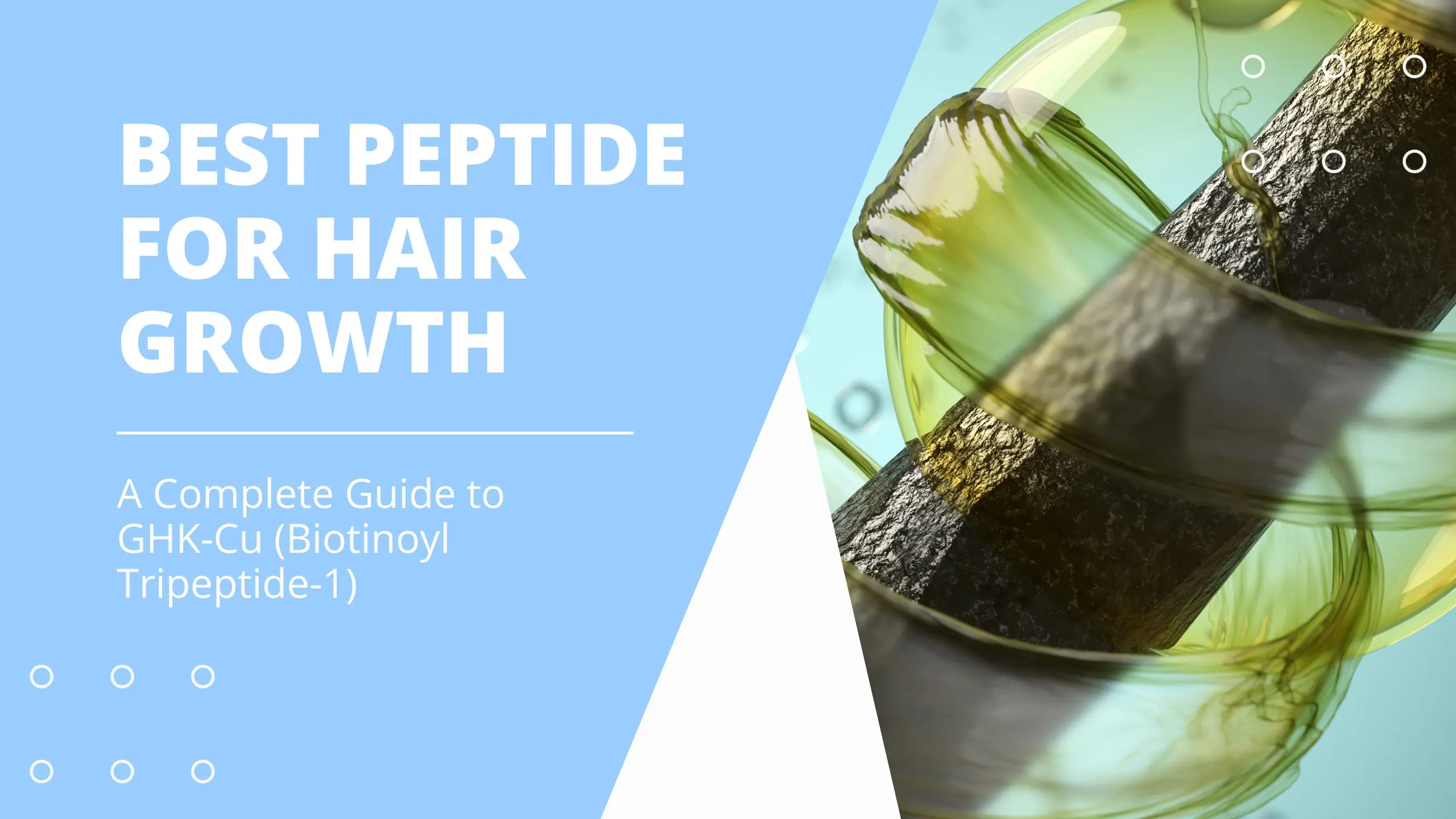Hair growth has been a captivating topic throughout history, with humanity exploring countless remedies, from ancient herbal concoctions to contemporary scientific advancements. In recent years, peptides have emerged as powerful agents in promoting hair growth, with one peptide—GHK-Cu (Biotinoyl Tripeptide-1)—gaining particular recognition.
In this comprehensive guide, we will explore the fascinating world of peptides, spotlight the exceptional properties of GHK-Cu, and discuss its inclusion in our Hair Rejuvenation Shampoo and our mesotherapy supplement.
What are Peptides?
Peptides are short chains of amino acids, the building blocks of proteins. They play a crucial role in various physiological processes, including cell signaling, immune response, and, pertinent to our discussion, hair growth.
In the realm of hair care, peptides are recognized for their ability to stimulate hair follicles, increase blood circulation to the scalp, and encourage the production of essential proteins like collagen and keratin.
The Best Peptide for Hair Growth: GHK-Cu (Biotinoyl Tripeptide-1)
Among the myriad peptides researched for hair growth, GHK-Cu has garnered significant attention. GHK-Cu, or Copper Peptide, is a naturally occurring peptide in the human body that decreases with age. Its potential for hair regeneration has propelled it into the spotlight of scientific research and hair care formulations.
How GHK-Cu Works:
- Stimulation of Hair Follicles: GHK-Cu stimulates the activity of dermal papilla cells, which play a vital role in hair follicle development and growth. This promotes the initiation of the hair growth cycle.
- Reduction of DHT: GHK-Cu, when combined with other peptides, can inhibit 5-alpha-reductase, the enzyme that converts testosterone into DHT—a key contributor to male pattern baldness.
- Anti-Inflammatory Properties: Reduces inflammation in the scalp, which supports hair retention, increases density, and improves vascularity.
- Increased Blood Circulation: Enhances capillary growth around hair follicles, improving nutrient delivery during early hair growth phases.
- Collagen and Elastin Synthesis: Supports the structural integrity of skin and hair, improving strength and resilience.
Understanding Hair Loss
To effectively address hair growth, it’s essential to understand the various factors contributing to hair loss. Hair loss is a complex issue influenced by genetics, hormonal changes, and natural aging.
Key Factors in Hair Loss
- Diminished Blood Supply: Reduced scalp blood flow can starve follicles of nutrients, weakening hair and causing loss. GHK-Cu enhances vascularization.
- DHT and Male Pattern Hair Loss: GHK-Cu helps inhibit 5-alpha-reductase, reducing DHT levels and promoting thicker, longer hair.
- Inflammation: Chronic scalp inflammation hinders hair growth. GHK-Cu’s anti-inflammatory properties help create a healthier scalp environment.
As we unravel the complex factors contributing to hair loss, it becomes evident that a comprehensive approach is necessary for effective intervention. Peptides, with their multifaceted effects on blood circulation, DHT levels, and inflammation, emerge as promising allies in the quest for healthier, fuller hair.
Scientific Studies Supporting the Best GHK-Cu Efficacy
The effectiveness of GHK-Cu in promoting hair growth is supported by numerous studies. These explore its effects on hair density, thickness, blood circulation, and inflammation.
Hair Density & Growth: A study in the International Journal of Trichology on androgenetic alopecia patients showed GHK-Cu improved hair density, thickness, and growth rate when applied topically.
Capillary Growth: GHK-Cu enhances nutrient delivery to follicles by stimulating capillary development, improving the early hair growth environment.
Inhibiting 5-alpha-Reductase: GHK-Cu helps limit DHT production, addressing the hormonal basis of hair loss.
Anti-Inflammatory Effects: Reducing inflammation leads to better scalp health, hair retention, and growth potential.
The Best Peptide for Hair Growth is Composed of 3 Amino Acids
GHK-Cu, or Glycyl-L-Histidyl-L-Lysine Copper(II), is composed of three amino acids:
- Glycine (Gly): The simplest and most flexible amino acid.
- Histidine (His): Contains an imidazole ring, key in biochemical reactions.
- Lysine (Lys): Contributes to protein stability and folding.
The copper ion (Cu) binds to this peptide, enabling its biological functions. This structure underpins GHK-Cu’s efficacy in skin regeneration and hair growth.
How To Incorporate the Best Peptide in Your Hair Care Routine
Our Hair Rejuvenation Shampoo blends GHK-Cu into a user-friendly product. Apply on wet hair, massage from front to back, let sit for 2 minutes, and rinse thoroughly (below 38°C / 100°F).
Usage tips:
- Oily scalp: daily use
- Dry scalp: once weekly
- Normal scalp: 3–4 times weekly
Follow up with our Hair Rejuvenation Conditioner to rebalance pH and boost hair softness.
Exploring Other Peptides for Hair Growth
While GHK-Cu (Biotinoyl Tripeptide-1) stands out prominently as the best peptide for hair growth, several other peptides have captured the attention of researchers and skincare experts for their potential in promoting hair health and mitigating hair loss. Each of these peptides brings a unique set of benefits to the table, offering a diverse array of solutions for those seeking to address hair thinning and loss.
Acetyl Tetrapeptide-3
Acetyl Tetrapeptide-3 is recognized for its ability to support hair follicle health. By anchoring hair more securely in the scalp, it reduces the risk of premature hair loss. This peptide is often incorporated into formulations targeting conditions such as alopecia.
Keratin Peptides
Keratin Peptides are formulated to replenish and strengthen hair strands. Given that keratin is the primary protein in hair, products containing these peptides contribute to improved hair strength, resilience, and manageability.
Collagen Peptides
Collagen peptides have gained widespread popularity for their myriad benefits in promoting skin, hair, and joint health. Derived from collagen, the most abundant protein in the human body, these peptides are broken down into smaller, easily absorbed fragments, making them highly bioavailable.
While GHK-Cu remains a frontrunner, exploring these additional peptides widens the scope of available solutions for individuals seeking to improve their hair health. As the field of peptide research advances, we can anticipate even more innovative formulations and combinations that harness the potential of peptides for optimal hair care.

Future Directions: Nanotechnology and Peptides For Hair Growth
The evolving landscape of peptide-based hair care is poised for a transformative shift, with the burgeoning integration of nanotechnology offering new dimensions of efficacy.
Nanotechnology, operating at the scale of nanometers, is revolutionizing the delivery of peptides. This section explores the nascent but promising alliance between nanotechnology and peptides, aiming to amplify their impact on hair health.
- Enhanced Peptide Delivery Through Nanoparticles: Nanoparticles can transport peptides deep into the scalp, improving absorption and effectiveness.
- Shaping the Future of Peptide-Based Hair Care: The synergy between nanotechnology and peptides may lead to more potent and targeted formulations.
- Potential Impacts on Treatment Outcomes: Improved delivery systems could result in more robust hair regrowth and better management of hair loss.
Peptides and Side Effects
The best peptide for hair loss, GHK-Cu, may contribute to reduced blood pressure due to its anxiety-reducing properties, but no other adverse effects have been observed in research studies.
Oral collagen peptides also appear safe; however, injections may cause side effects. Other peptides like CJC-1295 have been associated with mild side effects such as hives, nausea, flu-like symptoms, headaches, anxiety, and increased appetite.
The Best Peptide for Hair Growth: Conclusion
The exploration of peptides in the context of hair growth reveals their multifaceted significance. Peptides, with their pivotal roles in stimulating follicles, enhancing blood circulation, and combating inflammation, emerge as key players in promoting optimal conditions for healthy hair.
Among the diverse array of peptides, GHK-Cu stands out as a champion peptide for hair health. Its unique properties, including the stimulation of blood vessel growth and inhibition of DHT, showcase its potential to revolutionize approaches to combat hair loss and encourage regrowth.
As we navigate the realm of peptide-based hair care, it is crucial to emphasize the importance of a holistic approach. Beyond the scientific advancements, the efficacy of peptide treatments is complemented by self-care practices and a patient mindset. Nurturing hair health involves a combination of informed choices, consistent care, and a recognition that results may unfold gradually.
In the journey toward healthier, more resilient hair, embracing a holistic perspective that integrates scientific knowledge, self-care rituals, and patience becomes paramount. Peptides, with GHK-Cu leading the way, offer not just a solution but a comprehensive strategy for individuals seeking to enhance and maintain the vitality of their hair. As we move forward, the synergy between scientific innovation and mindful hair care practices holds the promise of a future where optimal hair health is within reach for many.




